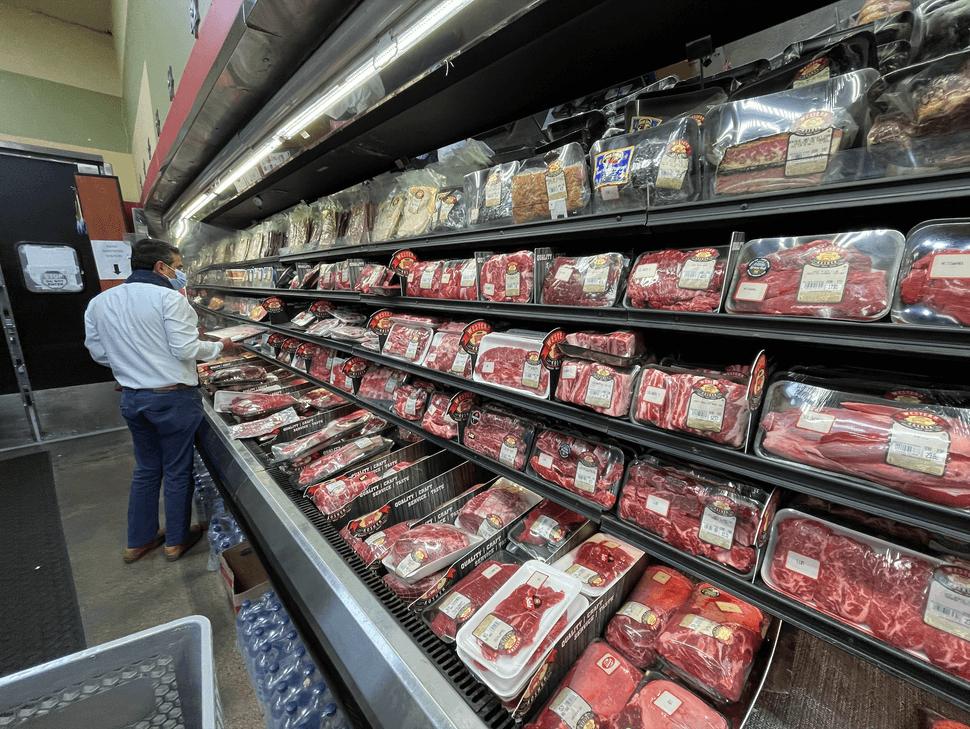‘Nearly impossible’: Canadian Jewish groups raise alarm about threat to kosher slaughter
Three of the country’s five kosher butchers have ceased operating since the country’s food agency began enforcing new regulations last year

The meat aisle at a kosher grocery in Los Angeles. Canadian food suppliers are importing kosher meat from the United States due to production decreases blamed on new federal regulations. Photo by Louis Keene
Three major Canadian Jewish groups say new rules have made kosher meat production in the country “nearly impossible” to sustain in the long term.
The Centre for Israel and Jewish Affairs, an umbrella organization that lobbies on behalf of Canada’s 400,000 Jews, and two Canadian kosher certifiers said in a statement Sunday that negotiations with the Canadian Food Inspection Agency over the new guidelines — introduced in 2019 and first enforced in 2023 — had failed to produce a viable compromise. Now they are threatening to sue the government over them.
The Jewish groups say the Safe Food for Canadians Regulations, which the agency says ensures animal welfare, have unreasonably slowed down the process of shechita, or Jewish ritual slaughter, and to no benefit to the animals.
“They’re allowing kosher slaughter to proceed, but they’re making it impossible for the facilities,” said Rabbi Saul Emanuel, director of Montreal Kosher, one of the kosher certifiers that signed the statement.
The CFIA said Tuesday in a statement to the Forward that the regulations were open to alternative procedures, provided they were evidence-based.
“Under the SFCR, food businesses have the option to use alternate procedures to those outlined in the CFIA Guidelines, if they are supported by evidence and meet the required outcomes of the SFCR,” a spokesperson wrote. “The CFIA always remains open to new scientific findings that can support animal welfare, and to listening to and engaging with stakeholders on the challenges they face as well as on potential solutions.”
But Jewish groups say their attempt to provide evidence of shechita‘s humaneness was rejected by the agency last month.
An unacceptably slow process
At the heart of the conflict is a disagreement over how to square ritual slaughter with modern ideas about limiting animal suffering, which dictate that the most humane way to slaughter a cow is by using a stun gun first to render it unconscious.
Use of a gun would violate shechita rules because animals must be healthy and uninjured when they are slaughtered by a blade. Kosher advocates — armed with research from veterinarians, pain experts and neuroscientists — maintain that shechita is the most humane method of slaughter.
The CFIA guidelines do not require stunning, but stipulate that absent stunning, a cow must pass several neurological tests, including three corneal reflex tests 20 seconds apart, to ensure that it is brain-dead, before it can be skinned and divided.
According to CIJA President Shimon Koffler Fogel, the CFIA’s approach to animal welfare through use of stunning targets the brain stem to incapacitate the animal, whereas shechita targets the cerebral cortex.
“In the case of shechita, the incision permanently interrupts the flow of blood to the brain and by definition achieves insensibility that cannot be reversed,” Koffler Fogel said in an email. “Despite the basic science that supports this assertion – and the evidence and testing undertaken over the past year to prove it, CFIA has not been willing to revisit the issue.”
Richard Rabkin, managing director of the Kashruth Council of Canada, a Canadian certifier that signed the statement, said the tests make a slaughtering process that previously took under a minute sometimes take a few minutes or more — drastically reducing the number of cattle that can be slaughtered per day.
Rabkin said the country’s kosher beef production had plummeted to one-fifth of 2023 levels as a result of the new standards enforcement. While declining to provide specific numbers as to how much kosher meat was produced now compared to in years past, Emanuel said that three of the country’s five kosher abbatoirs — in Toronto, Montreal and Lethbridge, Alberta — had ceased performing shechita since the change began being enforced. He declined to identify them.
Interim plans
Canadian kosher food suppliers have taken to importing meat from other countries, including the U.S. and Mexico, instead. It hasn’t produced a noticeable change in price for Canadian Jews — yet, according to Rabkin.
“But that’s not a long term strategy that’s viable for Canadian Jewry,” he said, noting that it could lead to shortages around holidays. He said certifiers felt they have “no option,” after the failed negotiations, but to pursue litigation.
The CFIA did not begin enforcing the 2019 guidelines until June 2023, according to the letter, which Rabkin said was a particularly lengthy rollout thanks to the pandemic. The groups’ attempts to appeal, with reports from various experts on the humaneness of their methods, were rejected last month, Rabkin said.
The joint statement indicated that while they will continue to pursue a resolution with CFIA privately, they will soon initiate legal action challenging the constitutionality of the regulations under the Canadian Charter of Rights and Freedoms.
“The Jewish community has been working with CFIA for 18 months trying to find a workable solution,” CIJA president Shimon Koffler Fogel wrote in an email. “The reason for the latest development and pursuit of a legal remedy is a reflection of our assessment that CFIA is not currently committed to identifying that solution.”
Correction: A previous version of this article misstated the name of the Centre for Israel and Jewish Affairs.





















